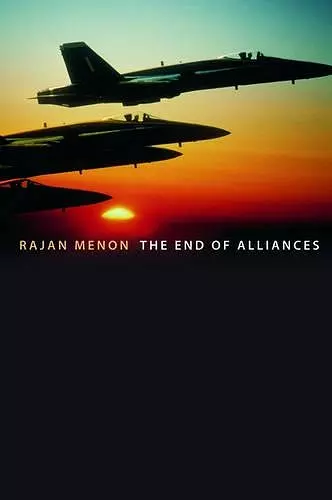The End of Alliances
Format:Hardback
Publisher:Oxford University Press Inc
Published:5th Apr '07
Currently unavailable, and unfortunately no date known when it will be back
This hardback is available in another edition too:
- Paperback£21.99(9780195377262)

Why should the United States cling to military alliances established during the Cold War when the circumstances are now fundamentally different? In The End of Alliances Rajan Menon makes the bold claim that our alliances in Europe and Asia have become irrelevant to the challenges the United States faces today and are slowly dissolving as a result. The dissolution of our alliances will not, Menon emphasizes, culminate in isolationism. The United States will, and must, be actively involved beyond its borders, but by relying on contingent alignments and on coalitions whose membership will vary depending on the issue at hand. America, he reminds us, engaged the world in a variety of ways for more than 150 years before entering into formal military alliances after World War II. While a strategy that ceases to rely on alliances will mark a dramatic shift in American foreign policy, states routinely reassess and reorient their strategies. The United States, which studiously avoided alliances for much of its history only to embrace them during the Cold War, is no exception. The End of Alliances predicts that the coming change in American strategy will force our traditional allies to rethink their choices and create new patterns in world politics. The controversial argument advanced by Menon will provoke debate among foreign policy specialists and the general public.
"Rajan Menon's book is indispensable reading for anyone interested in understanding America's position in the world in the decades to come."--Hendrik Spruyt, Norman Dwight Harris Professor of International Relations, Northwestern University
"In this book, Rajan Menon has accomplished something that many people call for but almost no one actually does. He has thought originally, from the bottom up, about how the United States should conduct its foreign policy--and proposes a major shift in the way America spends money, makes promises, and commits troops. A change like the one he outlines is coming sooner or later, and it will turn out better for America and the world if his argument gets the attention it deserves."--James Fallows, national correspondent of The Atlantic Monthly and author of Blind into Baghdad
"In this powerfully argued and elegantly written book, Rajan Menon makes the case that the American foreign policy of the future will differ dramatically, and in ways not yet fully appreciated, from the international role of the United States to which the world, and Americans, became accustomed in the second half of the twentieth century. The End of Alliances will be widely discussed and debated both in the United States and in the rest of the world."--Michael Mandelbaum, author of The Case for Goliath: How America Acts as the World's Government in the Twenty-first Century
"Menon makes a compelling case that Washington's foreign policy is at a critical juncture: if the United States alters its policy with a maximum of speed and grace, it can preserve--even strengthen--its political and economic relationships with long-standing allies; if American leaders stubbornly attempt to preserve obsolete security arrangements, they risk permanently damaging those important relationships. This is an important book on U.S. foreign policy in the twenty-first century."--Ted Galen Carpenter, Vice President, Defense and Foreign Policy Studies, Cato Institute
"With elegance and wisdom, Rajan Menon shows why America's Cold War alliances make little sense, and why they need to be jettisoned in order to deal more effectively with the fundamental realities of the contemporary world. Whether one agrees or disagrees, this book both illuminates and stimulates. The End of Alliances is an outstanding contribution to the ongoing debate about America's role in the world."--Melvyn P. Leffler, Stettinius Professor of American History, University of Virginia
"Menon shows that the role of traditional alliances is fated to diminish even if America shifts to a more restrained global stance. Menon's astute analysis is a warning against relying on these allies to be the linchpin of a new, post-Bush foreign policy."--Jack Snyder, Robert and Renée Belfer Professor of International Relations, Columbia University
ISBN: 9780195189278
Dimensions: 162mm x 236mm x 24mm
Weight: 535g
280 pages